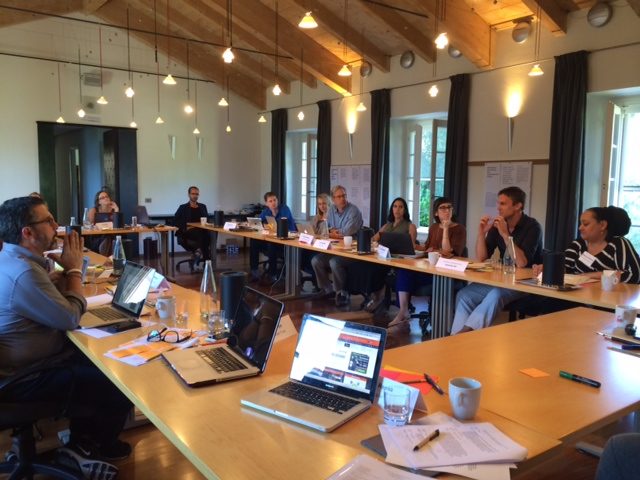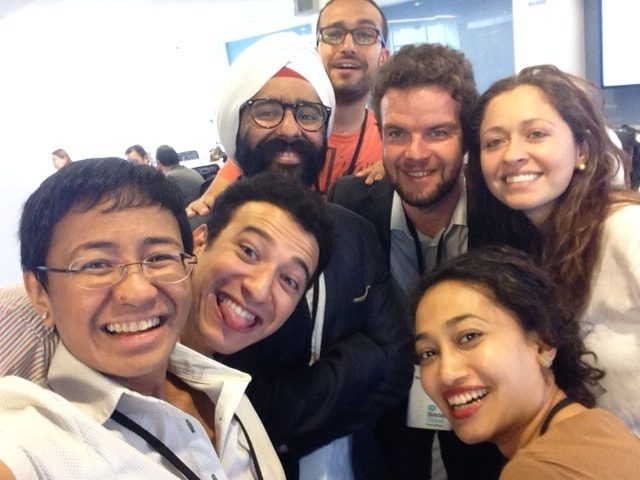SUMMARY
This is AI generated summarization, which may have errors. For context, always refer to the full article.

Look at that picture.
It was raining early morning of September 4 in Bellagio, Italy. So we weren’t prepared for what happened at 7 am when the sun’s rays touched the mountain and turned the gloomy landscape golden. Then the rainbow. It was magical.
Inspirational.
For 3 days, the Rockefeller Foundation brought 16 of us together from all over the world to understand how storytelling can motivate action. Most were from non-profits and cause-oriented groups, but there were also artists, novelists and those who work for technology platforms like Tumblr and Google.
Underlying our intense discussions was an innate belief in the goodness of human nature. We talked about social good, intertwined with complex issues of politics and economics of Africa, Southeast Asia, the Middle East, and the United States.
I’ve been a journalist for nearly 30 years. We tell stories to hold the powerful accountable. We’re cynics, looking for holes in an argument.
Believing in the innate goodness of people becomes challenging when you cover as much conflict and disasters as I have: in my 20s, I watched more than 600 bodies buried in a mass grave; in my 30s, watched 8 people beheaded in one weekend and saw ethnic, separatist and sectarian violence on a scale I couldn’t imagine; in my 40s, I investigated terrorist networks and countries turning themselves inside out. Through it all, the constants of politics, economics and the social problems of the developing world provided daily fare.
Bellagio was the second time this year I met with strangers and imagined a better world. The first was in Washington, DC organized by the UN Foundation soon after I became one of 5 global advisers for +SocialGood, a platform that “unites a global community of innovators around a shared vision: the power of technology and new media to make the world a better place.”
Melinda Gates introduced +SocialGood at last year’s Social Good Summit in New York City, and she turned the tables around by asking me questions about what we’re doing in the Philippines.
The key idea is simple: we are all connected, and if we work together, we can solve any problem.
It is a joy to work with people who are actively doing something to solve the world’s biggest problems. It is a relief to realize that journalists can now do more than just tell stories because of new technology and the Internet.

Peer-to-peer networking, social media powered by the principles of social network theory, crowdsourcing and big data allow journalists to harness bottom-up actions and energy for social change.
Last year, we partnered with Google and UNDP to bring together more than 1,000 people in Manila live-tweeting to ripple across the world, kicking off the global Social Good Summit. We introduced Project Agos, a platform to harness bottom-up crowdsourcing – real-time reporting – and marry it with top-down government workflows. (Little did we know that Typhoon Haiyan, known as Yolanda in the Philippines, would ravage our country a little more than a month later.)
This year, we have an ambitious 4 day summit: two days in the capital, Manila; and two days in Tacloban, the symbolic epicenter of Haiyan. The only way we could do this is because of an amazing collaboration with presenters Microsoft and the Global Center for Journalism & Democracy, along with our partners – Globe, the Ayala Foundation, Ayala Land, AzCom, IpStar – and our sponsors, the Friedrich Naumann Foundation (FNF), International Organization for Migration (IOM), World Vision, and the Mind Museum.
Working and pooling our resources together, we are able to bring in wonderful speakers from around the world to Manila and Tacloban to share their experiences and insights.
Threading through all 4 days are 3 themes: the power of technology to change lives and society; the evolution of journalism and its role in society; and the absolute imperative to understand climate change and prepare for disaster in the Philippines.
We want you to imagine what the world should or could be in 2030. What if it were #2030NOW?
+SocialGood restores my faith in human nature. It reminds me that there are many good people around the world who want to help, and if given a chance, they will. We just need to organize ourselves – to structure the narratives for action – leverage our networks and collaborate for common goals.
There is no better time than now.
At Bellagio, novelist Justina Chen captured the spirit of why we created Rappler. She said, “If I can win your heart, then I can reach your mind, and I can activate your feet into action.”
For us at Rappler, PH+SocialGood is a way to bring the Philippines to the world…and the world to the Philippines in a meaningful way.
So why PH+SocialGood?
Look at the rainbow. – Rappler.com
Add a comment
How does this make you feel?
There are no comments yet. Add your comment to start the conversation.